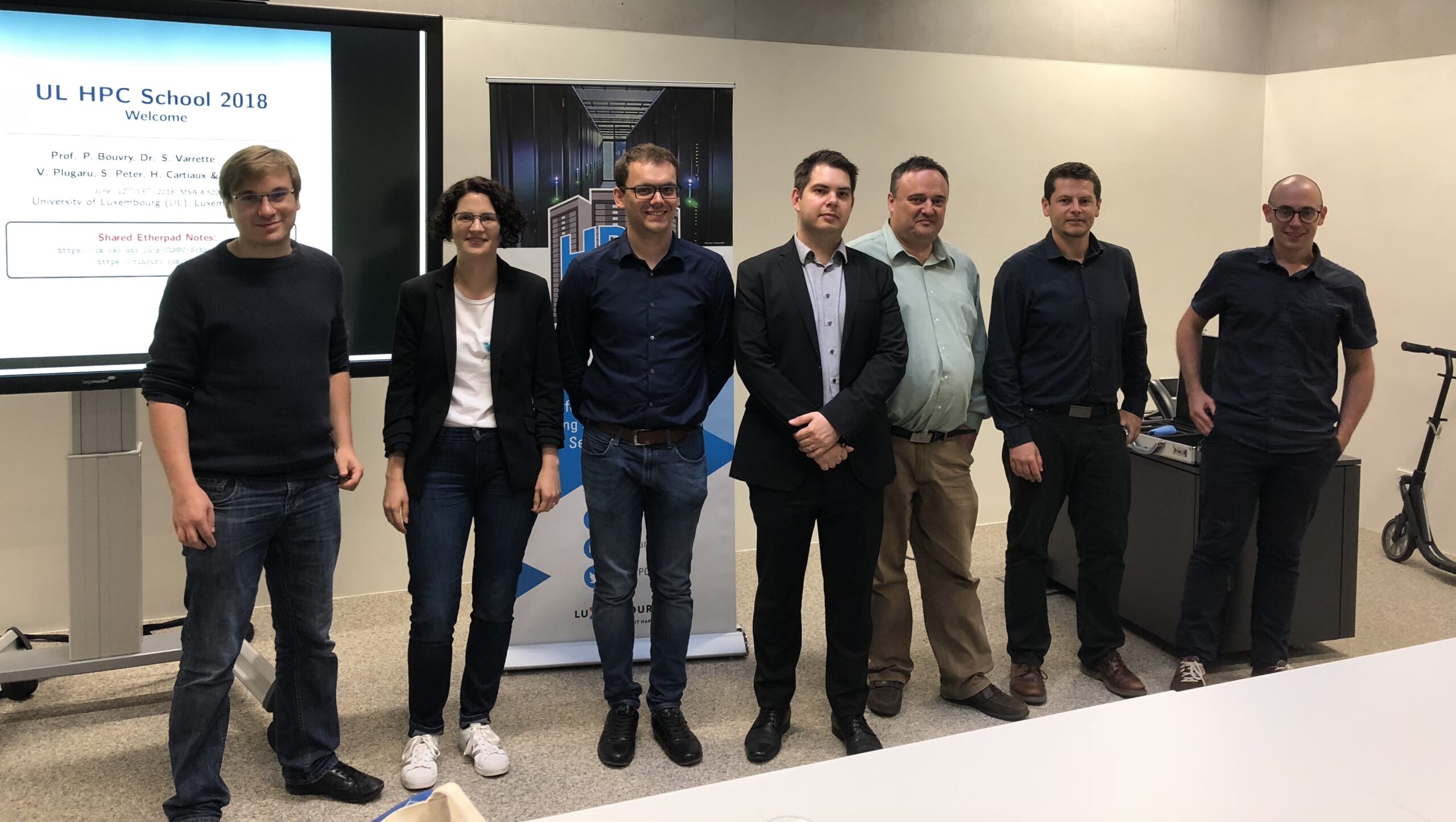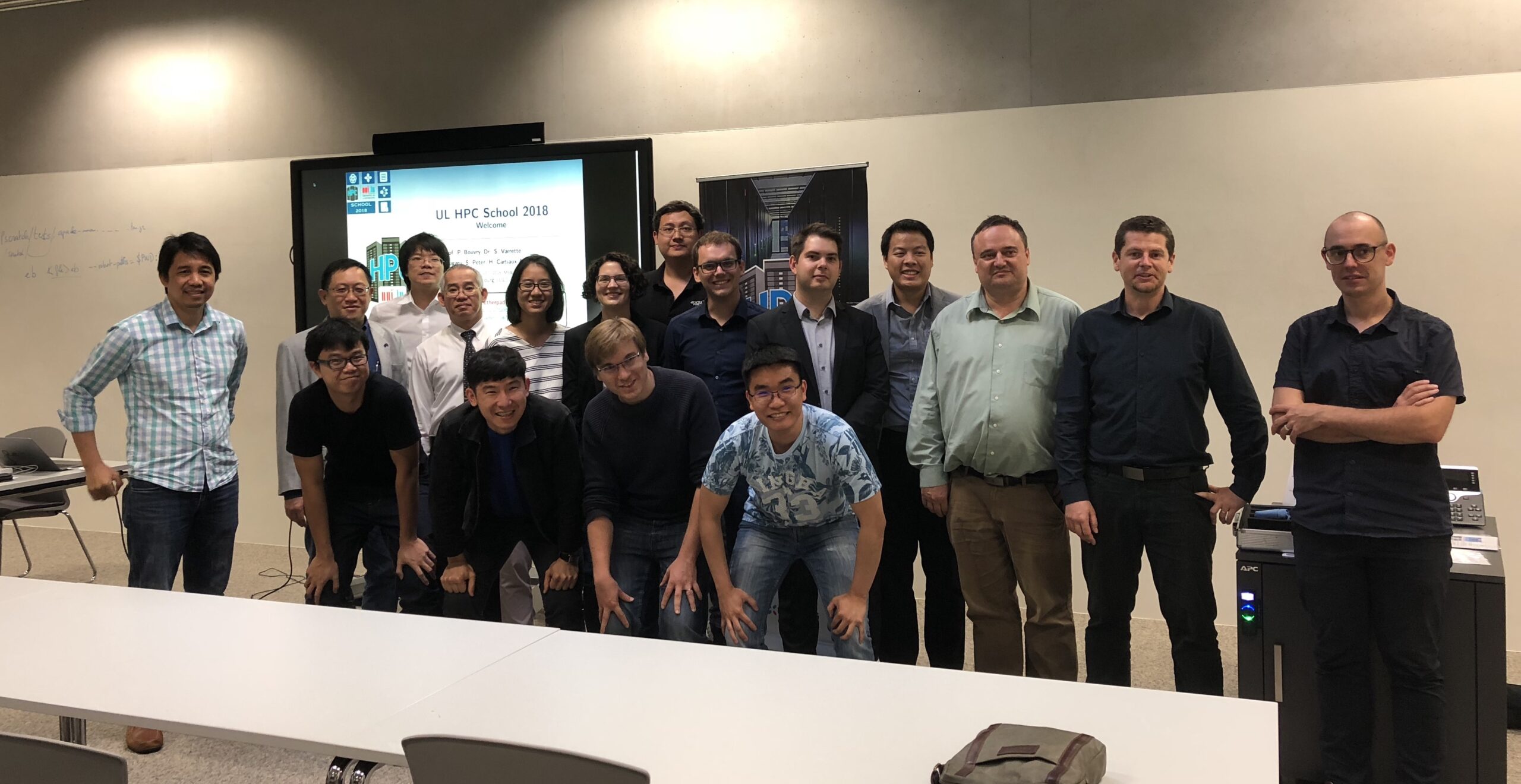From 12 to 13 June 2018, the seventh edition of the Uni.lu HPC School successfully took place on Belval campus. This was again the opportunity to offer up-to-date overview of the HPC (High Performance Computing) developments recently performed within the University, as well as instructions and practical sessions on a variety of topics representative of research activities and domains present at the university that benefit from HPC.
With around 90 highly motivated participants, the seventh edition of the Uni.lu HPC School was a great success. Apart from the traditional keynote presented by Dr. Sébastien Varrette (manager of the HPC facility and of the associated expert team of system administrators with Prof. Pascal Bouvry), which offered an up-to-date overview of the HPC and Big Data (BD) developments within the University but also at the national and European level, a series of practical sessions and keynotes were offered. In particular, the HPC team, together with leading computational scientists of the University of Luxembourg and HPC technologists (namely Dr. S. Varrette, Valentin Plugaru, Sarah Peter, Hyacinthe Cartiaux, Clément Parisot and Dr. Aurélien Ginolhac) covered in two parallel sessions a wide range of topics, such as:
- Access to and interaction with the HPC infrastructures
- HPC challenges, especially as regards the storage data management (backups, git, GDPR, quotas)
- HPC workflow management (for sequential and parallel tasks)
- HPC programming and usage of the main software available on the platform, with dedicated sessions directed towards Matlab, R, Python, OpenMP/MPI, MultiPhysics, Chemistry, Bioinformatics, Big Data analytics (with Hadoop and Spark), Deep and Machine learning (Tensorflow, Keras…) etc.
- Performance engineering for HPC debugging and profiling
- Software environnent management
- Virtualisation with singularity containers on the clusters
It is worth to note that following the Open Science paradigm, the material of all proposed tutorials is publicly available since the very first edition on github and on http://ulhpc-tutorials.readthedocs.io/.
In all cases, questions and exchanges were fruitful during this seventh edition of the event. The user session proposed on the second day was also well appreciated, as it presented research outcomes as well as HPC aspects from some of the platform’s top users, covering a broad range of domains:
- Big Data and multi-criteria decision making, by Prof. Raymond Bisdorff
- FAIR [biological] data management, by Dr. Roland Krause from the LCSB
- Scalable optimization algorithms, by Emmanuel Kieffer from the CSC/PCOG group
- eXtended Discrete Element Method, by Wahid Mainassara from the RUES/LuxDEM group
- Large-scale theoretical chemical physics, by Dr. Igor Poltavskyi from the PHYMS

From left to right: Hyacinthe Cartiaux, Sarah Peter, Clément Parisot, Valentin Plugaru, Pascal Bouvry,
Sébastien Varrette and Aurélien Ginolhac. © University of Luxembourg
Last but not least, this edition has seen a co-located joint event with the organization of the Uni.lu–NSTDA workshop (as part of the EU-ASEAN E-READI programme). More precisely, an expert team delegation from the National Science and Technology Development Agency of Thaïland was welcome over the week to offer, in addition to the HPC School, technical exchanges to sustain the national HPC developments in progress within both countries (i.e. Luxembourg and Thaïland).

The next edition of the Uni.lu HPC School is expected to take place in November, 2018 in Belval (the exact date will be communicated in due time).
————
Since 2007, the University of Luxembourg has invested more than 9 million euro into its own HPC platform in order to support and drive innovation within strategic research areas of international importance, also closely linked with the realities of Luxembourg’s society and economy. Combining large computing power and huge data storage capacities, the facility offers a competitive and attractive research environment to ensure cutting-edge results in time. Today, more than 500 computer scientists, engineers, physicists, material science researchers, biologists, and even economists have the opportunity to run on this platform intensive computations and perform Big Data analytics as part of their research.
The HPC facility is managed by an expert team under the responsibility of Prof. Pascal Bouvry and Dr Sébastien Varrette from the Computer Science and Communications Research Unit (CSC). Composed of several clusters of compute nodes, the HPC platform has kept growing over time thanks to the continuous efforts of the University of Luxembourg HPC Team. It now provides a total computing capacity of 423 TeraFlops (1 TeraFlops = 1012 floating point operations per second) (when including GPU accelerators) and around 8.8 PetaByte of shared data storage (1 Petabyte = 106gigabytes). The HPC centre of the University of Luxembourg is one of the major actors in HPC and Big Data for the Greater Region Saar-Lor-Lux.
Having this platform available for researchers and PhD students at the University of Luxembourg is a chance to deeply accelerate their workflow and analysis, however the effective usage of such a complex system requires both talent and system skills to understand the impact of its personal workflow on the global performances of the system. In this context, the HPC team at the University of Luxembourg organises twice a year an HPC School, which offers instructions and practical sessions on a selected set of topics.
For more information: hpc.uni.lu.
